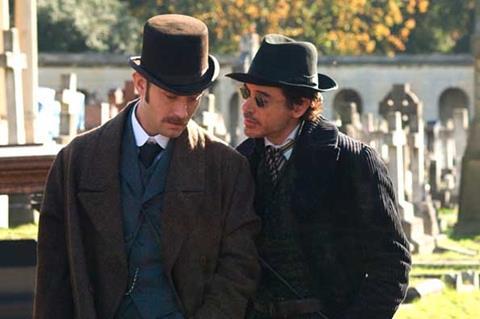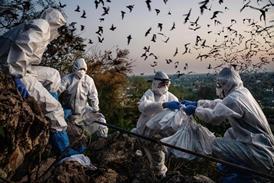In the past few years, London has metamorphosed into one of the most film-friendly big-city shooting destinations in the world. Matt Mueller find out why.

” Up to five years ago, the default answer to shooting in London was, ‘No,’” says Zygi Kamasa, managing director of Lionsgate UK and producer of the company’s first production, Blitz. “Now it’s, ‘Yes, we can do anything for you.’”
London has long been the most popular destination for big-budget international and Hollywood productions outside North America. The establishment of Film London in 2003, which has helped clear away the bureaucratic murk of what has notoriously been one of the most stubborn and awkward cities for film-makers to shoot in, has brought about a locations revolution for producers seeking to spice up projects with London scenery.
“For somebody from Los Angeles, it’s romantic, the food is great, the studios and crews and skill levels are all superb”
John Davis, producer
In recent years, the capital has witnessed amazing location firsts including The Bourne Ultimatum’s Waterloo train station setpiece, shutting down part of Whitehall to orchestrate a V For Vendetta crowd scene in front of the Houses of Parliament, and the Bollywood production 0800-Love which shot an enormous dance sequence on Tower Bridge.
“That was the gauntlet thrown down to us,” says Film London’s chief executive Adrian Wootton. “Our job was to open up the visual lexicon of London, to make the palate of London richer for film-makers to use their imaginations.”
But for the biggest Hollywood productions, it is still the city’s major studios that attract them, not locations. In 2009 alone, Gulliver’s Travels, Sherlock Holmes, Clash Of The Titans, Robin Hood, Inception, Nanny McPhee And The Big Bang and Harry Potter And The Deathly Hallows have all used Pinewood or Shepperton studios, with Hallows also using its long-time residence at Leavesden and Clash Of The Titans occupying Longcross Studios in Surrey as its centre of operations.
“It’s the same thing driving all these movies,” says Titans producer Kevin De La Noy, who is based in Los Angeles and London. “You have quality crews that don’t need to live in hotels ― and enough of them to service three or four films contemporaneously. You’ve got all the ancillary back-ups with prop houses and crafts people. And if you qualify as a British cultural film, you have access to the rebate. All of that gives the UK a very competitive edge.”
The days of arranging London locations in a piecemeal fashion, or visiting the local police station to beg for a permit, are firmly in the past
De La Noy claims Titans passed its rebate-qualifying cultural test with flying colours. “We ticked practically every box,” he says. “If you get 16,
17 points ― and most studios like a two-point margin ― to qualify, you can work out your potential rebate, and it’s much easier for the studios to look at their investment.”
Twentieth Century Fox’s Gulliver’s Travels also qualified for the UK tax rebate, which producer John Davis admits was a decisive factor in coming to London for a spring and summer shoot. There were other bonuses.
“If you’re shooting a movie, London’s a great place to live,” he says. “For somebody from Los Angeles, it’s romantic, the food is great, the studios and crews and skill levels are all superb. Our favourite place to shoot is in LA but if you’re going to have to be away for three or four months on a big movie, then it helps to be in a great city. Once we got over the jet lag, we had the benefit of everybody feeling less weary than they would on a four-month production schedule because they had the city on weekends.”
Davis looked at Eastern Europe and Canada before settling on London, and determined the exchange rate and tax incentives made the UK more economical.
“The economics penned out best so it was a no-brainer,” says Davis, who also shot on location in Greenwich, including the Old Royal Naval College. “The English architecture is so beautiful that it gives your movie scope and grandeur.”
For De La Noy, the exchange rate is also a significant contributory factor for attracting large-scale productions. “We experienced a 23% differential over the period we were budgeting this movie,” he says. “It was a massive drop from doing The Dark Knight at $2 to the pound whereas we were budgeting Titans at $1.47. That makes a huge difference on your gross and your net.
But because these circumstances are very positive for the UK, you also have to bear in mind you’ll have a lot of films chasing a finite amount of resources.”
The days of arranging London locations in a piecemeal fashion, or visiting the local police station to beg for a permit, are firmly in the past. Among the improvements Film London has introduced include having one central hub ― the Metropolitan Police Film Unit ― for policing and security; simplifying the permit process to shoot in the Royal Parks; helping push a bill through Parliament to allow road closures; and implementing a standard code of practice for London boroughs.
“We’ve made it a lot less byzantine,” insists Wootton. “The attitude of the boroughs has changed dramatically. They see the benefit now to their local economy.”
Kamasa’s $20m cop thriller Blitz shot entirely in London, ranging across 20 locations from Brixton to Shoreditch. One of the crucial factors that helped was hiring a location manager with London experience, who was able to cut through what can still be some sticky red tape.
The other caveat for London shoots is the security issue. “When you’re having to leave very expensive equipment overnight in places like Tower Hamlets, the temptation is there for the locals to nick things,” he claims.
Conservation issues, parking and sensitivity to often reluctant residents are also considerations. “Producers might want blanket free parking or super access,” says Wootton, “but you’re never going to completely rewrite the infrastructure of parking in this town. You have to work within the grain of what’s possible.”
And for all the recent triumphs, you can still have landmarks that refuse to allow access, as Westminster Abbey did to Ron Howard on The Da Vinci Code.
And despite what has appeared to be a bumper year for the Pinewood Group, it still posted a drop in revenues and profits in August, which chief executive Ivan Dunleavy blamed on the recession and the lingering effects of the Screen Actors’ Guild dispute. Furthermore, not every major production decides to film in London: Marvel Studios had explored the prospect of bringing over Kenneth Branagh’s Thor but now says, “There are no immediate plans to shoot in the UK.”
Wherever Thor lands, London’s reputation as a film-friendly city continues to be boosted, with Wootton fielding more queries from European film-makers, such as Paolo Sorrentino, while its studios remain ahead of the pack.
In 2010, Disney’s fantasy epic John Carter Of Mars, Clint Eastwood’s Hereafter and Tim Burton’s Frankenweenie are all expected to shoot in the UK, and potentially the fourth instalments of the Pirates Of The Caribbean and Bourne franchises.
“Sure, you have Barrandov, Cinecitta, Babelsberg, but London will remain supreme because it has the best transport links, the best props and costume houses and the talent pool,” remarks De La Noy. “Systemically it has the edge, but the issue ultimately will be based on exchange rates and rebates as to whether it stays fully booked.”
If the tax rebate were ever to be withdrawn, British Film Commissioner Colin Brown says: “We’d drop off a cliff in terms of inward investment. But from the government’s point of view, it’s cultural, it employs graduates, it results in intellectual property, and they get a lot of tax because all these guys are quite well paid. I don’t think it’s in any danger of being taken away.”
A final word of warning to producers thinking about shooting in London during 2012: prepare yourself to face an Olympic-sized gauntlet.






















No comments yet